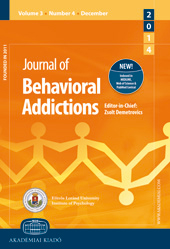A Longitudinal Study of Factors Explaining Attitude Change Towards Gambling Among Adolescents
A Longitudinal Study of Factors Explaining Attitude Change Towards Gambling Among Adolescents
Author(s): Ståle Pallesen, Daniel Hanss, Helge Molde, Mark D. Griffiths, Rune Aune MentzoniSubject(s): Individual Psychology, Cognitive Psychology, Experimental Pschology, Substance abuse and addiction
Published by: Akadémiai Kiadó
Keywords: attitudes; longitudinal; change; gambling;
Summary/Abstract: No previous study has investigated changes in attitudes toward gambling from under legal gambling age to legal gambling age. The aim of the present study was therefore to investigate attitudinal changes during this transition and to identify predictors of corresponding attitude change. Methods: In all 1239 adolescents from a national representative sample participated in two survey waves (Wave 1; 17.5 years; Wave 2; 18.5 years). Results: From Wave 1 to Wave 2 the sample became more acceptant toward gambling. A regression analysis showed that when controlling for attitudes toward gambling at Wave 1 males developed more acceptant attitudes than females. Neuroticism was inversely related to development of acceptant attitudes toward gambling from Wave 1 to Wave 2, whereas approval of gambling by close others at Wave 1 was positively associated with development of more acceptant attitudes. Continuous or increased participation in gambling was related to development of more acceptant attitudes from Wave 1 to Wave 2. Conclusions: Attitudes toward gambling became more acceptant when reaching legal gambling age. Male gender, approval of gambling by close others and gambling participation predicted development of positive attitudes toward gambling whereas neuroticism was inversely related to development of positive attitudes toward gambling over time.
Journal: Journal of Behavioral Addictions
- Issue Year: 5/2016
- Issue No: 1
- Page Range: 59-67
- Page Count: 9
- Language: English

